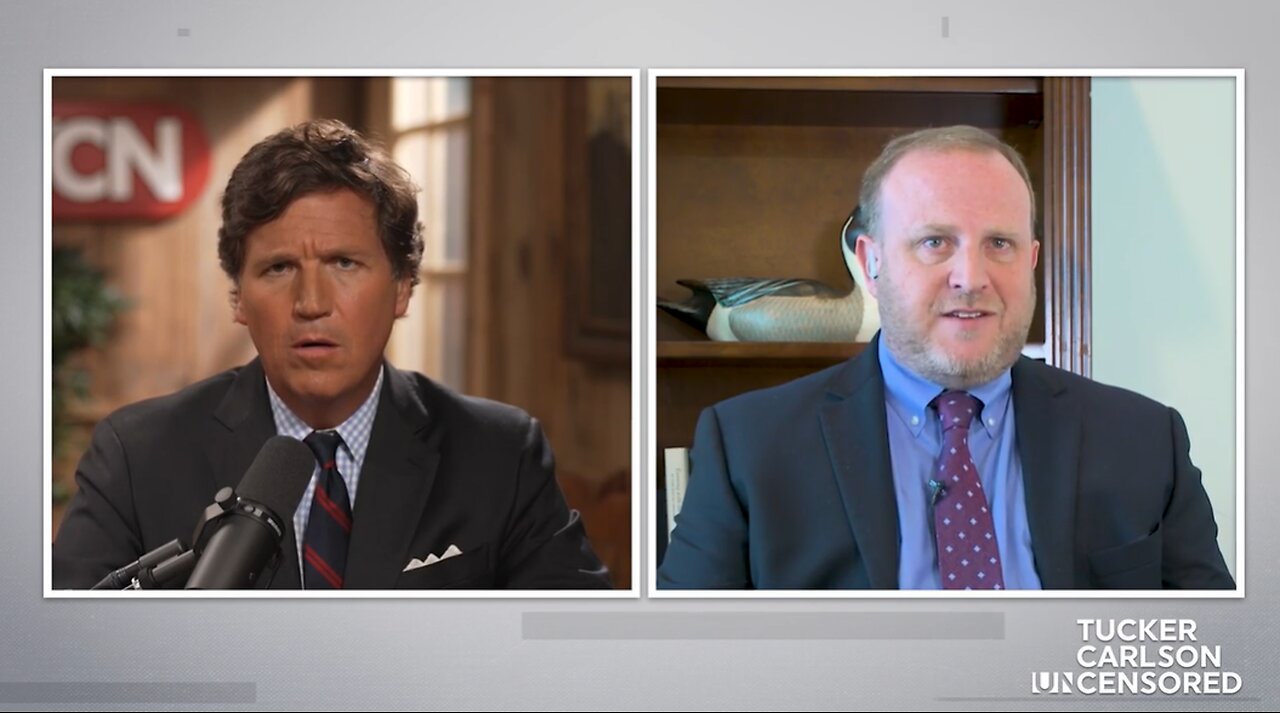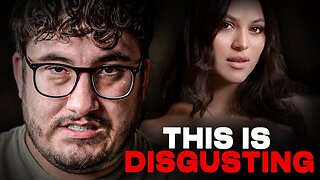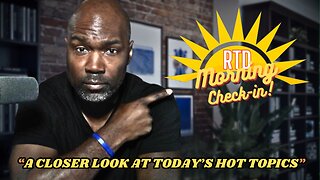Premium Only Content

Tucker Carlson Uncensored: Systemic Racism Against White Americans author Jeremy Carl
"The Unprotected Class, How anti-White Racism Is Tearing America Apart"
There is systemic racism in the United States, against whites. Everyone knows it. Nobody says it. How come?
Published Apr 24, 2024
link to original here >>> https://tuckercarlson.com/uncensored-jeremy-carl-racism/
transcript
Tucker [00:00:00] If somehow you were able to be airlifted directly or teleported directly from 1994 to 2024, you'd notice an awful lot of changes. Primary among them would be the internet. But the biggest change you'd probably notice about our public conversation is how white people were so openly attacked and denigrated. Yes, a racial group. So in 1994, you were about 30 years past the civil rights movement. And in 1994, the operating assumption of virtually everyone in the United States was the main lesson of the civil rights movement. Of the letter from the Birmingham Jail on the Edmund Pettus Bridge, and all the different sacred moments that we grew up hearing about. The main lesson of those moments was it is immoral, in fact, unacceptable to attack people on the basis of their race. So then, if you fast forward 30 years to find the same country engaged in a public hate frenzy against people because of their race, you would find that bewildering. How did this happen? Of course, there would be the discrimination, the institutional racism of hurting people on the basis of their race in hiring, in admissions to schools, in federal contracting, in promotions. There would be all of that, but there would also be the public manifestation of it, of saying, oh, well, we just don't like you. You're not as good. You are morally defective because of your skin color. You say this about white people, people who founded the United States. You'd be shocked by that. And then to turn on the TV and see the president of the United States do the very same thing. You'd think maybe you'd been drinking ayahuasca. You'd see Joe Biden say things like this:
Biden Soundbite [00:01:38] History has thrust one more urgent task on us. Will we be the generation that finally wipes out the stain of racism from our national character? We've all seen the injustice on the neck of Black Americans. Racism, nativism, fear, demonization have long torn us apart. But a black parent, no matter how wealthy or how poor they are, has to teach their child. When you're walking down the street, don't have a hoodie on when you go across the street. Domestic terrorism from white supremacists is the most lethal terrorist threat in the homeland.
News Soundbite [00:02:19] If I were your daughter, what advice would you give me the next time I am stopped by the police?
Biden Soundbite [00:02:26] If you're my daughter, you'd be a Caucasian girl and you wouldn't be pulled over.
Tucker [00:02:31] White supremacy is the most lethal threat to the United States. White people are the threat. They are evil and they are dangerous. That's not just a senile President making that one statement. That is the people in charge of the country reinforcing that statement and that theme every single day of the year, not just by their words, but with their deeds. What is this? Why does no one mention it's happening? Why does anyone who does mention it's happening get attacked as a white supremacist for complaining about racism? And maybe more important, where does it go? Is there any other ending to the story but hurting people physically, lots of people? Could we have a resolution that doesn't look like Rwanda? Jeremy Carl is an author who's thought a lot about this. He's got a brand new book called The Unprotected Class, How anti-White Racism Is Tearing America Apart. He joins us now. Jeremy, thanks so much for coming on. It may be a an advantage or maybe disadvantage of being a little bit older that it's this is like the one thing you never thought or I never thought you would see in America, which is our leaders openly attacking people on the basis of their race. Just 60 years after the civil rights movement that supposedly taught us the opposite lesson in the Civil Rights Act. So how did this happen, do you think?
Jeremy Carl [00:03:43] Well, it's an interesting question, right. And I think you just hit on a key point, which is 60 years. We are as far now from the Civil Rights Act as they were basically from the Wright brothers. So there's been a lot of time that's kind of, a lot of water under the bridge since that time. And a lot of things have happened. And I think it was begun with very sincere intentions, but I think rather quickly, certainly, you know, 10, 20, 30 years down the line, it got really hijacked to the point that we went from trying to treat people equally to what has eventually amounted to reverse racism.
Tucker [00:04:19] Right? Or just I guess I would just call it racism, because it seems like the standard would remain the same. No matter the race of the person being discriminated against. You can't attack people. You can't punish people for the color of their skin for how they were born. So like that seems like a pretty easy principle to uphold is pretty straightforward.
Jeremy Carl [00:04:38] Well, I would agree with you, Tucker, but it's, you know, nonetheless, we're really seeing throughout and this is what I really wrote the book about throughout many different areas of endeavor, and whether that be when we're looking at how, crime gets talked about to what's going on in Hollywood, to the educational system and monuments coming down and everything you could imagine, kind of the white person is kind of the great enemy. It's the, the kind of, the evil guy in 1984, the kind of two minutes of hate we have to have against him. The Emanuel Goldstein figure, kind of is the white person in particularly the Democratic Party discourse today.
Tucker [00:05:20] What's interesting, though, is it typically when you see these moments of scapegoating, which are clearly, you know, kind of inherent to people, I mean, they pop up in every society at every time through history, like there's something in people that wants to separate a small group and like, blame all its problems in that group. But it's usually it's the minority. Of course, you know, the persecuted minority, whites are still, for at least as of today, probably change soon, of course, but they are still the majority in the country. So like, have you ever seen anything like that happen?
Jeremy Carl [00:05:48] You know, I haven't Tucker. It's it's kind of amazing to watch because this is whites are still a 58% majority. It's no longer a majority of the under 18, but of adults it's still a solid majority. It's a super majority of our voters still in every presidential election, although just barely in the last presidential election. And yet they've become this figure of hate. And it's really been kind of fascinating and disturbing to watch and to kind of think about why that happened. And one of the things I suggest in my book is that really ultimately, this is a legitimizing ideology for ultimately resource transfer and resource confiscation. And that takes, the form of some of this reparations conversation or land back or some of these other things, and they sort of start out on the extreme left and everybody goes, oh, well, that's silly. That's never going to happen. And then all of a sudden, you know, it is happening and you're a racist if you think it's a bad idea.
Tucker [00:06:44] Yeah. I mean, of course it's happened and it's still happening in other countries. You know, Rhodesia became Zimbabwe and the whites were killed and their land was taken and their money stolen. And it's happening in South Africa right now. Of course, we're not supposed to look at it, but it is happening, actually. I wonder why people are, why the majority is putting up with it?
Jeremy Carl [00:07:04] Well, that's a good question, Tucker and I, I can't even fully I don't have the perfect answer for that myself. And ultimately, I one of the main reasons I wrote this book is because I don't think the majority, I don't think anybody should be putting up with it, regardless of race. I mean, we shouldn't have, we shouldn't be putting up with racial discrimination in our society in 2024. But I think, you know, kind of white people, they're almost it's like a Stockholm syndrome, almost where they're they're like in a hostage mode in terms of some of the ways that they're thinking where they they sort of are in love with their captors. And they're not able to kind of accept what's going on, and particularly on the left, it's this sort of notion that, because we, of course, like every nation, have had an imperfect past, that white people have some hereditary blood guilt. And I think the balance of American history just shows that that's a really myopic and childish way to look at our history in our country.
Tucker [00:07:59] Well, it's demonstrably absurd if America is so racist, if systemic racism is such a barrier, then why are nonwhite people moving here by the millions. So obviously that's silly, but it's a little weird to say that, you know, you hate whites, but you need to live in a country founded by whites who systems are Anglo systems like that. I mean, maybe I'm being too logical here, but it doesn't make any sense.
Jeremy Carl [00:08:22] No, it doesn't. And I mean it sort of. It points to some of the absurdity here. And you also touched that. Of course, people from all sorts of different backgrounds are clamoring at the door. We're right now dealing with this, of course, with illegal immigration. And even if you look at some of these groups and again, something I discuss in the book, there are all sorts of nonwhite ethnicities in this country among immigrants and among citizens, in which, particularly among Asian American groups, but not exclusively. I mean, if you were to even look at Nigerian Americans, or particularly Igbo Americans, for example, they would have an average, higher, income than the average white American. And so this kind of notion that whites are sort of on the top is really a selective editing of any story, no matter how true that belies that or any statistics that belie that. It's one of the reasons you actually see Asian Americans frequently eliminated from these comparison sets when they're talked about, because it doesn't tell the story that, the left wants to tell.
Tucker [00:09:21] Well, it's just a lie. I mean, the Labor Department collects these stats and you could say, well, maybe they're fake stats. Tell me how they're fake, but they've been, this trend has been going on a long time. I don't, I don't know if native born whites are in the top ten for income, actually, groups, but they're not near the top of the top ten, that's for sure. I've seen the numbers. I just saw them. So that's, so you're lying if you say that. So there's that. But again, I want to get back to the core question, which is why would anybody put up with this, this were happening to people from Madagascar? I would be as against as I am now. But it's particularly weird that the people whose ancestors founded the country are putting up with it. I hear all the time young people say, well, like, I can't really get a job. I have no expectation working in a big company because I'm a white male. It's like, why would you accept that? Like if you're 22, what did you do to deserve that? And what does it say about your country that it's doing it to you? Like why do people put up with that for a second?
Jeremy Carl [00:10:13] I agree, Tucker, I mean, and I wrote this book because I didn't understand that either. And what I the only thing I can come up with, they're not the only thing, but the leading kind of hypothesis I can have is that a lot of people have kind of been so brainwashed by a lot of the propaganda from the left, that they're just simply not aware of some of the realities here. And so what I've tried to do in the book is just to detail the enormous number of ways throughout many, many different areas of endeavor right now where whites are being discriminated against and to say, hey guys, we shouldn't be putting up with this. Why are we putting up with this? We certainly wouldn't put up with it if any other group were being discriminated against in this way. So why do we not have the self-respect to kind of, stand up for ourselves?
Tucker [00:11:00] Well, I, I couldn't agree more. And it's not that we wouldn't be putting up with it if any other group was being discriminated. It's just that other group wouldn't be putting up with it. And you see that, and there are groups who just won't put up with it. And I say that with admiration because why would anyone put up with racism, especially since anti-racism being against racism is our state religion. So I mean, how paradoxical that in a country where the one thing you can't be is racist, that anti-white racism is enshrined in law, custom and culture and no one mentions it?
Jeremy Carl [00:11:34] I agree, it's mysterious. And I think one of the encouraging things is when I started to write this book a couple of years ago, and when I started even more thinking about writing this book, a few years before that, a lot of this stuff felt very taboo to even mention, even though it's obviously, as you just noted, it's it's obviously self-evidently true. And therefore it shouldn't be taboo at all. And I think one of the encouraging things is that we're beginning to see people and, and you've really been a stalwart on this, but there have been there been other folks in the media environment, folks like Matt Walsh and Charlie Kirk. And there have been politicians, guys like J.D. Vance who are kind of now speaking up, and they aren't just saying like, hey, it's fine. You know, you can just go discriminated against white people and that's fine. We're not going to say anything or we're going to be too cowed. We're going to be too intimidated. I've really seen an improvement in the dialog just in the time even I've been writing this book. But at the same time, there's still a long way to go before we really kind of reach a point where we can have a candid conversation about this stuff that is actually based on reality, rather than a left wing fantasy.
Tucker [00:12:42] I guess what what bothers me a little bit is that, you know, the justification for hurting whites has always been effectively as a species of the reparations argument. Like, you know, whites have hurt other people, therefore it's their turn in the barrel or something like that. You need to make up for something that your ancestors did, I guess, but that, I guess, kind of works sort of. Maybe if you're talking about the majority. But the second whites are no longer in the majority, and that's going to happen very, very soon, maybe already has happened. We don't know because we don't know the real population numbers because of illegal immigration. But we're right on the edge of whites not being the majority. Like at that point do whites get to say, well, now I want you know, some advantage in college admissions. Now, I want my kids to go to Harvard for free. And I want government contracts in a preferential way. Like what happens then? Or does the anti-white hate just get louder?
Jeremy Carl [00:13:39] Well, that's the concern. And I think one of the things again, I talk about in the book, is we are essentially moving, as you just alluded to, to what is effectively a post white America. Now, how quickly we get that depends on whether Joe Biden ever decides that he's going to shut the border, and whether the Republicans are ever actually going to do anything if he continues to refuse to. But we're headed in that direction. And so then the question becomes, when you look at the history of multi-ethnic countries where you have unequal resource distribution and whatever else, that is a recipe historically, not in every case, but in many, many cases for violence. And so that should be of great concern to us. Yeah. And again, I'm not sort of I didn't write this book with the notion that, hey, you know, we just are writing this for white people, and white people should be the only one caring about it. Every American who is interested in living in what is going to be a multi-ethnic country that, gives hopefully equal rights to everybody should be concerned about this issue, because if we don't treat a very large group fairly, then there are going to be some people are just saying, you know, I'm not going to put up with that and who knows where that leads, but not anywhere good, I wouldn't think.
Tucker [00:14:54] Well, and you already see it at the margins. You know, you don't want people to be radicalized. You want people to have to be radicalized along racial lines because they're irresolvable opinions change, skin color doesn't. So if we have any kind of race conflict, it it can it can go on for many generations and has, of course. But I think about South Africa, which in 1994, when it was handed voluntarily to the ANC, had nuclear weapons. And now parts of the country don't have consistent electricity. So the ANC is totally destroyed the country, it's a black party, and yet they're still blaming whites, the small minority of South Africans who are whites for all the problems. And so you're thinking, well, if that's the future here. Like, that's very grim, I think.
Jeremy Carl [00:15:41] Oh, absolutely. And I'm not, I'm not. So I don't think fortunately, things are so dire here that we're likely to wind up in a South African situation where they can't even keep the power on. But I do worry that we may be Brazilianizing our society, where you essentially have, a few people kind of at the very top, living with guards, kind of under a lot of security. And things are maybe kind of good for them. And everybody else is sort of, you know, in a much worse sort of situation. And you kind of have, certain types of, of very polarizing racial politics beginning even to emerge, in Brazil as well. So I think, you know, I'm not worried that we're going to turn into South Africa tomorrow because of that. But given America and given our history and traditions and and the great beacon of freedom and opportunity that we've been for everybody, to even take a step in that direction is just something that we should do everything that we can to hopefully avoid.
Tucker [00:16:46] Yeah. I mean, I should say about Brazil, you know, Brazil's had a pretty pyramid shaped economic system for a long time, and I don't think that's a good thing. You want a middle class, but Brazil has not had Brazil is a multiracial society like way more than the United States. A lot of people from different ethnic groups, okay, who intermarry and always have for hundreds of years, they haven't had until pretty recently, like the last ten years, hard core American style race politics. These have been economic arguments, which I think are fine to have because your economic system can be changed with one piece of legislation. Your race can never be changed. So I, I don't understand the difference ideologically between just ideologically, leaving aside resources and history and all this stuff. But like the ideas of like the Barack Obama Democratic Party seemed identical to the ideas of the ANC or Malema in South Africa, I don't what, is there a difference that you see?
Jeremy Carl [00:17:42] Well, I don't think there is. I mean, okay, I mean, we're not yet at the kind of "Kill the Boer" chant level of, of overt racism in, in South Africa that they have, although that we're kind of heading maybe in that direction.
Tucker [00:17:54] There was a book last year in Amazon, it was a bestseller. It was like eliminate whites. I mean, that was the name of the book written by some Indian guy. What?
Jeremy Carl [00:18:03] It's it's yeah, it's crazy. And, I think it's certainly there's a lot of concern that we should have about the situation that we're in right now. But I'm not necessarily of the view that that it's going to be quite as bleak as it currently is in South Africa. But what I do see is that, some of this rhetoric is just incredibly toxic from the Democrats that, the direction that they would like to go is really of a sort of racial caste system, and that what we, what we're going to kind of do as a result of that is going to be something that would be very, very bleak for, for every American. But but certainly for white Americans most of all. And again, we've got to start calling them out on this, because until, you know, if we were letting them get away with these sorts of lies of, kind of police racially targeting African Americans and, and kind of, you know, America's history is nothing but violence and racism. Then, it's going to be very, very bleak in terms of what things are going to look like in the future of this country.
Tucker [00:19:11] And my last question, since I know you've thought about this more deeply than anyone, probably. Do you see this accelerating or do you foresee I'm saying prayers for this, a future where we're not like talking about race that much, because it's not that interesting. And we're talking about the things that unite us in the ways to make the country better. Like what it does seem like this election year may be a potentially a turning point or an acceleration. Which do you think?
Jeremy Carl [00:19:38] Well, I think that the left is definitely accelerating. I mean, as it becomes less and less true to speak of any sort of white systemic racism, the left is just amping up their, their conversation, about that, you know, their rhetoric around that. At the same time, I think there is more resistance that I just touched on. And you and others have really been in some ways at the forefront of that, which I'm very thankful for. But, I kind of feel like the best case that's realistic is that to use a kind of Cold War analogy, we move to what's called a mutually assured destruction. And that keeps us safe. So with the left has to understand, is when they use this type of racial rhetoric that is scapegoating whites, that is blaming everything on whites. That is saying white people are kind of the cause of all problems or that are going on in this country that, they need to understand that there's going to be a very painful and direct political blowback to them for doing that. And, that requires us to organize on our side to say, to actually arrange that type of blowback, to make them understand there are cost to that type of racist rhetoric that they're using. And then if that happens, they may say, well, okay, you know what? Maybe it's best that we kind of cool this off, that we don't use this type of rhetoric, that really what we want to do is, is sort of take race out of the public dialog. In this way, we're not going to scapegoat whites anymore because we understand that that, creates a politically painful scenario for us as well. But to create that sort of thing, which I think would ultimately lead to racial peace, and it would allow us to talk about these things that, as you know, would be much, more important and things that we should all be caring about far beyond race. We need to be a credible, credible deterrent to them. We need to show that we're not going to put up with, what, the sort of behavior that they've been engaging in. That's why I wrote my book, The Unprotected Class. And I sort of suggest in the book that, you know, ways that we can go to get there.
Tucker [00:21:46] Man, I, I couldn't agree more. I remember watching the Republican still, the Republican governor of New Hampshire, Chris Sununu. Really, what kind of an awful person, but say that the problem with New Hampshire was there too many whites in it? I remember thinking, is anyone else hearing this? You're attacking people who live there, whose ancestors have been there for 300 years to attack them because their skin color really, and he gets reelected by Republicans. And so I hope your book increases the sanctions on people who use racist ideas for political gain, because I think it's wrong.
Jeremy Carl [00:22:17] Well, I agree, and I appreciate having the opportunity to go on and talk about it with you and appreciate all the work that you've done to really highlight this issue over the years.
Tucker [00:22:26] Yeah, I mean, I'm fine, by the way. You know what I mean? It's the principle that drives me crazy.
Jeremy Carl [00:22:33] No, but I think I'm great. I'm I'm glad, Tucker, that you mentioned that because, there's, you know, one of the rhetoric, one of the things that they used to kind of try to shut us up is to say, oh, you know, it's it's just whining. It's it's your being. You must be a loser. You must have a terrible life if you're worrying about that. No, I actually have a fantastic life. Personally, I have a loving family. I'm really happy, you know, five kids. But I'm looking at the future of our country. Yeah, and I'm concerned about the really concerned about the direction. And I'm concerned about my future for my kids. And not just for my kids, but for other kids of all different races in the U.S.. I want them to grow up in a country of opportunity and a land of opportunity for everybody, which was the country that I really grew up in. But I think in many ways this is becoming less true for everybody. Now, if you don't kind of check the right demographic boxes. And so that's why I wrote the book and that's why I'm speaking out.
Tucker [00:23:24] Amen. You have your own water fountains. You got, you got some balcony seats in the movie theaters. Shut up and stop complaining you whiner. It's like what? It offends me as a Christian, I'll say that. Anyway, thank you so much, Jeremy. Good to see you.
Jeremy Carl [00:23:39] Thank you so much, Tucker, for having me on.
-
 LIVE
LIVE
Steven Crowder
3 hours ago🔴 We are So Back: How Trump Flexed American Muscle and Owned Colombia
41,848 watching -
 LIVE
LIVE
Caleb Hammer
45 minutes agoHomewrecker Ruins EVERYTHING To Steal Married Old Men | Financial Audit
182 watching -
 UPCOMING
UPCOMING
The Shannon Joy Show
50 minutes ago🔥🔥Bobby Kennedy Goes To Washington! Can He Tame The PHARMA Giant & STOP mRNA Expansion?🔥🔥
38 -
 LIVE
LIVE
Tudor Dixon
1 hour agoThe Woketopus: The Dark Money Cabal Manipulating the Federal Government | The Tudor Dixon Podcast
29 watching -
 LIVE
LIVE
MrBigKid
15 hours agoS&W Bodyguard 2 ... Why is it so different!?
95 watching -
 LIVE
LIVE
LFA TV
22 hours agoICE ICE BABY! | LIVE FROM AMERICA 1.27.25 11am
5,593 watching -
 34:58
34:58
Rethinking the Dollar
1 hour agoDeep Seek AI: The US Equities Breaking Point?
1.93K1 -
 1:15:25
1:15:25
Graham Allen
3 hours agoTrump BULLIES Colombia Into Following His Policy!! + FINALLY PETE IS CONFIRMED!
68.4K73 -
 1:01:50
1:01:50
Kyle Fortch
2 hours ago $0.72 earnedCallum Kerr Joins Netflix’s Biggest Shows & Signs First Record Deal | THE ONE SHEET S1E1
23.5K1 -
 2:04:19
2:04:19
Matt Kohrs
10 hours agoMARKETS CRASH: The DeepSeek Panic || The MK Show
46.7K5